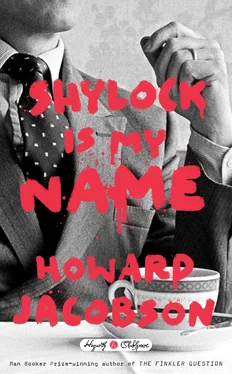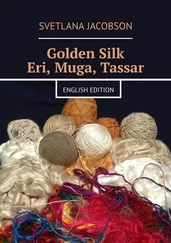And then, of course — talking of dying — there was the money needed to escape in a hurry when the hour came, scooping what was left of his family into his arms and never stopping to look back. Even the Jewishly on-again off-again Strulovitch was never Jewishly off-again when it came to believing this: safety was not to be taken for granted, the danger hour always came around.
In the meantime, knowing each morning that his wife would be washed, that his daughter would be educated, and that his money would be there when he needed it for bribing officials at borders, or just for carers of his own, left him free to pursue his interests. And pursuing his interests kept him from bewailing the ruins of his wife. There was a great deal to be said, Strulovitch believed, for keeping busy, the other word for which — as Beatrice’s teachers were surely telling her with relish — was capitalism.
But he didn’t revel in wealth. He revelled — in so far as he could be called a reveller at all — in the world he could see. I already am spiritual, he would have said to anyone who tried to remind him of all that wasn’t worldly — I am spiritual to the degree that I think the material world is infused with the divine.
And love?
He didn’t understand how anyone could love what wasn’t visible.
This didn’t mean he didn’t love his daughter when he didn’t see her. But then when didn’t he see her? Worry is a way of keeping an image close and safe, and from the moment of his wife’s stroke — no, further back than that — he had worried about his daughter constantly.
They had waited a long time for their only child — a wait more agonising for Kay, who spoke conventionally of hearing her clock ticking and dreaded running out of time altogether. He hadn’t especially wanted children and suspected other men of exaggerating when they said their hearts burst at the sight of their first child, but his own heart did exactly that. Partly this was on behalf of Kay. A vicarious joy compounded by relief and terror — for to want something as much as she had was surely an invitation to disappointment or worse. Doubly fragile and precious is that child whose conception relies on miracle. And there was the usual selfishness, too. When he looked at the baby Beatrice he saw himself projected into the future. But he gave in momentarily to the “clouds of glory” experience as well, imagining her as an emissary from God, fancying that her eyes were still closed against the brightness of the effulgence she had witnessed before coming here. And that in its turn raised the question of which God that was, and what message Beatrice was bringing from Him. Was this a religious moment for Strulovitch? He didn’t think so. He didn’t do religion. He didn’t pray. He didn’t bind his arm or cover his head. Devotionally he did so little he might as well have been a pagan. And the moment itself, however one described it, didn’t last long enough to effect a transformation. But he would have admitted, if pressed, that the God whose glory he imagined his baby daughter squinting against was the Jewish God not the Christian, a being too serious and majestic ever to have taken human form. Nothing more. The beginning and the end of Strulovitch’s seeing into the heart of things, but it was enough to determine the course of his preferences for Beatrice once and for all. She should have a Jewish husband, not because he looked down on non-Jews, or wanted his Jewish line to continue, but because her life had started seriously, in a sort of pain of remembered solemnity and anticipated grief that could not be thrown away on merely arbitrary affection and wilfulness — on whim or spite or capricious apostasy, or even haphazard love, however deeply felt — but owed, and was owed in return, an obligation of honour and loyalty, no matter that he was damned if he knew loyalty to what. Something that wasn’t just hers to determine — was that it? A covenant. Something that would have found tangible expression in circumcision had she been a boy. Something in the nature of an oath of allegiance, never mind that she was not in any position, as someone born only an hour before, to swear it on her own behalf. And wasn’t that the reason why he, as her father, was obliged by all he understood as holy, to swear it for her?
“Swear.”
He swore.
Swore to keep the covenant.
Not without looking about him to see if anyone was watching — in particular Kay, for whom this moment of supreme motherly love was complete as it was, and who wouldn’t have wanted it scarred with whatever it was that had taken possession of her husband: superstition, fanaticism, tribalism, a seriousness too great for mortal flesh to bear — but he swore nonetheless.
D’Anton performed a secondary function for Plurabelle in that he was well and variously connected and could extend her circle to people she would not in the normal course of things encounter, no matter that many were her neighbours. The models and actresses, bankers, rappers, star footballers and breakfast TV astrologers — the obvious ones — she could find herself. And when she didn’t, they found her. But cricketers and rugby players, accountants, architects, designers, life coaches and even the odd free-talking bishop (for D’Anton’s family had Church connections that went far back) — such B-listers, who were not entirely without glamour, she was soon relying on D’Anton to provide. He knew people of this sort because they paid him to fill their houses with beauty and sometimes even hunt out specific paintings for them. “Anything you can get me from the Sistine Chapel,” was one request. “A painting of gay men screaming at one another in the lavatory by that guy they say wrote Shakespeare,” was another. Plurabelle marvelled at the breadth and variety of his connections.
Sometimes he rolled his eyes in her direction when he brought them to her parties, as though to say they were unaccountable for by him, not of his doing or acquaintance, and she would do well to have security staff keep watch on them.
Once he introduced her to Mehdi Mehdi, a French Algerian ventriloquist who was in hiding from the French and Algerian police on account of the Nazi ideology his dummy espoused, though he persuasively argued, in D’Anton’s view, that as a ventriloquist he had neither person nor ideology of his own and employed his dummy to comment critically (though it wasn’t strictly speaking his business to be a critic either) on the ideology in question. When quizzed by journalists as to the fondness he appeared to feel for his dummy, and indeed the fondness it inspired, he offered no reply in his own voice but left it to the doll to say that if the unintended consequence of his fame was that half the youth in France was giving Nazi salutes that was better than their making the Star of David.
Plurabelle was astonished to learn that half the youth of France had been making the Star of David.
D’Anton waved away her concern. “He’s amusing,” he said, “in a vindictive and perhaps even mendacious way, but he’s essentially sound and good value to have at a party.”
Plurabelle understood the distinction and told D’Anton to bring him and his dummy along. She was pleased to discover they were both good dancers. But for his being wanted by the police she would have had him, or at least his puppet, on The Kitchen Counsellor in argument with a rabbi.
A rabbi, ideally, who was also a ventriloquist, so that their dolls could have gone at it hammer and tongs.
What it was about him that appealed particularly to sportsmen neither she nor D’Anton could have said, but his puppet’s hallmark Nazi salute was soon being copied in France by footballers who had been to see his act in underground cabarets in Marseilles, and in Cheshire by footballers who thought it chic to do what the French did, though of these Gratan Howsome — the latest of D’Anton’s invitees — was the only professional so far actually to perform it on the field of play.
Читать дальше












